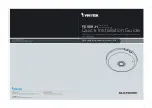
SROS Command Line Interface Reference Guide
Global Configuration Mode Command Set
5991-2114
© Copyright 2007 Hewlett-Packard Development Company, L.P.
427
allow list
(continued)
self
When the
self
keyword is applied, packets permitted by the ACL destined for any
local interface on the unit will be allowed. These packets are terminated by the
unit and are not routed or forwarded to other destinations. Using the
self
keyword
is helpful when opening up remote administrative access to the unit (Telnet, SSH,
ICMP, Web GUI).
stateless
When the
stateless
keyword is applied, traffic is not subject to the built-in firewall
timers. Stateless traffic bypasses the application-level gateways (ALGs). Stateless
processing is helpful when passing traffic over VPN tunnels. Traffic sent over VPN
tunnels is purposely selected and encrypted; there is no need to firewall the traffic
as well. VPN configurations created using the VPN Wizard in the Web GUI use
stateless
processing by default.
allow reverse list
The
allow reverse list
command is identical in function to the
allow list
command with the exception of the
reverse
keyword. The
reverse
keyword
instructs the firewall to use the source information as the destination information
and vise-versa in the specified ACL.
discard list
All packets permitted by the ACL will be explicitly discarded upon entering the
interface that the policy class is assigned to. All packets denied by the ACL will be
processed by the next policy class entry or implicitly discarded if no further policy
class entries exist. Possible
discard list
actions performed by the access policy
are as follows:
discard list
<access control list name>
discard list
<access control list name>
policy
<access policy name>
discard list
<access control list name>
self
policy
<access policy name>
When the
policy
<access policy name>
is specified, the firewall attempts to
match the specified access policy with the access policy that is applied to the
packet's egress interface as determined by the routing table or policy-based
routing configuration. If there is a match, the firewall will process the packet. If
there is no match, the firewall will process the packet based on the next policy
class entry or implicitly discard it if no further policy class entries exist.
self
When the
self
keyword is applied, packets permitted by the access-control list
destined for any local interface on the unit will be implicitly discarded.
nat source list
All packets permitted by the ACL entering the interface to which the policy class is
assigned will translate the source IP address of the packet to the specified
address
or
interface
and an association will be created in the firewall. This
function is commonly referred to as a “many-to-one NAT”. All associations created
by the
nat source list
are subject to the built-in firewall timers (refer to
policy-timeout <protocol> <range> <port> <seconds>
packets denied by the extended access control list will be processed by the next
















































